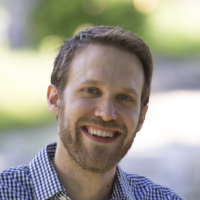In new research published in Political Theology, Aaron Stauffer, a postdoctoral researcher at the Vanderbilt Divinity School and the Wendland-Cook Program in Religion and Justice, explores the impact of shared sacred values on the efficacy of community-organizing initiatives.
Recent examples of such initiatives include the national movement to denounce racial injustice in the wake of the killings of George Floyd and others, as well as the massive campaigns to promote and protect voting among marginalized citizens. Both are part of a long tradition of marginalized and oppressed communities organizing to mobilize greater democratic power. One strand of this tradition is that of broad-based community organizing, most famously associated with Saul Alinsky and César Chávez. This political practice is grounded in the uniting of relationships and values to increase the democratic power for all working people.

In his research, Stauffer examines the role of “relational meetings” between stakeholders as a means to build power and expand the coalition. He argues that effective community organizers ground these relational meetings in shared sacred values between stakeholders. “The relational meeting is really a unique space where theology and organizing begin to be enacted together,” he said. Without this common ground, the meeting becomes about power over another, as opposed to relational power through sacred values and shared interests.
Stauffer argues that effective relational meetings should be intentional, public and one-on-one. Moreover, the meeting should be focused specifically on the movement, but with room for both stakeholders to share their personal connection to the cause. “This creates a sense of shared values around what is sacred to each individual,” Stauffer said.
An effective organizer asks probing questions during a relational meeting and comes from a place of genuine curiosity. For many, Stauffer says, the organizer’s cause may provoke triggering or traumatic memories. Questions must be directed with care and concern to allow both parties to be vulnerable.
“This is the deeply countercultural aspect of the relational meeting,” Stauffer said. “We are not used to being vulnerable in public about the things we collectively hold most dear.” Though potentially uncomfortable at times, Stauffer argues that vulnerability is a required space to engage in the mutual and co-constructive work of building democratic relationships of solidarity.
Stauffer sees the sharing of sacred values via a relational meeting as a Christian practice. “Though the relational meeting is a conversation, it involves a form of listening that is attentive to one’s own and other’s suffering, to their vulnerability, and for Christians it inevitably involves the question of what God has to say about such suffering and pain,” Stauffer said. Moreover, a relational meeting can help organizers and stakeholders understand how their individual story fits in with the larger Christian tradition and narrative, and to uncover what the Christian faith may have to say about the political movement.
Stauffer believes that relational meetings are an important tool for community organizers fighting for marginalized communities. When effectively implemented, relational meetings can strengthen broad-based community-organizing efforts fighting for racial and economic justice, LGBTQ rights, and access to health care and education. His research, “The Relational Meeting as a Political and Religious Practice,” was published in the March 2021 edition of Political Theology.